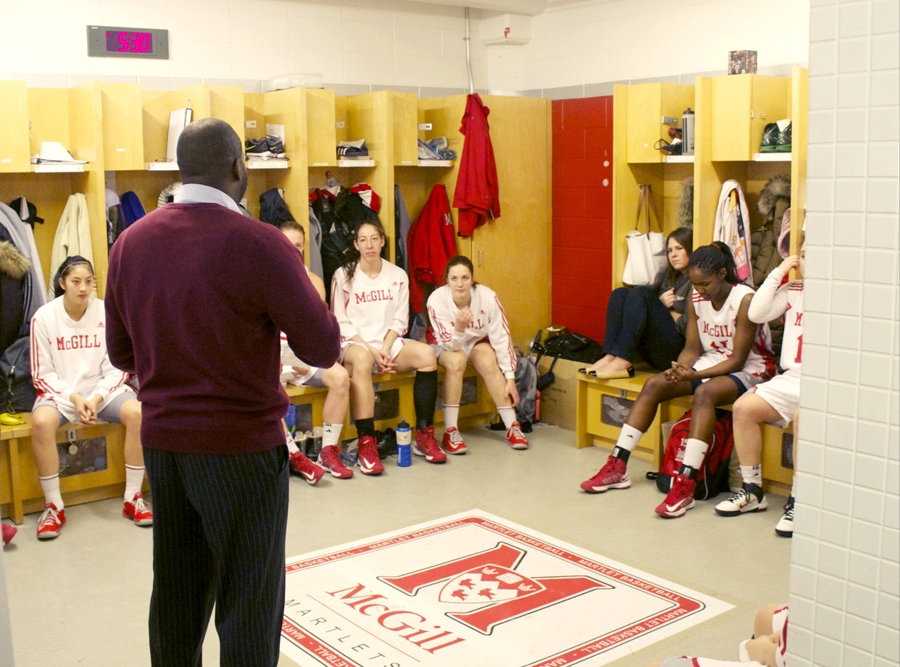
“What should we do better? What else can we do better?”
It’s 5:30 p.m., and the Martlet basketball team is sitting in front of a television. They’re not catching the latest Breaking Bad episode, nor are they relaxing on a couch chatting with friends. Rather, what separates this group from their typical undergraduate peers is the person standing in front of them, Martlet Head Coach Ryan Thorne, gesturing at the screen where all attention is focused.
The women have notebooks out. Pens scribble, pages turn, and heads shift from their coach to the paper in front of them. For the players, this is a standard video review session the day before a game. The team is watching footage of themselves playing against Laval earlier in the year, and Coach Thorne is grilling them about their efforts on screen.
“What can we do better?” Coach Thorne asks again.
The players respond, immediately pinpointing the issues Coach Thorne wants addressed: they need to improve their awareness on the court, their communication, and tighten their pick-and-roll defence. The team’s knowledge of the game is obvious, Coach Thorne leaning back and nodding as each player contributes to the discussion.
Laughter dots the hour-long session. As I will discover in my two days with the team, levity and seriousness balance each other out in the Martlet locker room. However, there is one key aspect that’s never absent: focus.
[pullquote]There is a look of respect on every player’s face. They have reached this level of excellence together as a team.[/pullquote]
The Martlets leave the video room a short while later, jogging across the corridor to Love Competition Hall where they hold their practices. They are clearly eager to get a basketball in their hands after staring at a screen for an hour.
The team needs no prompting from Coach Thorne as they warm-up—they’ve been through these motions many times before. The mood is light and relaxed, and the group’s chemistry is on full display. The Martlets are extremely comfortable with each other, both on and off the court.
“Before the game, we put some music on, [and] sometimes some girls dance,” rookie forward Mariam Sylla says, laughing.
As Coach Thorne calls the Martlets to centre-court and practice formally begins, the mood change in the gym is palpable. Intensity uproots the lightheartedness immediately. It’s time to work.
The team begins rapidly—suicides, full-court drills, half-court drills—with Coach Thorne focusing on the issues they identified during the film session. The players pick up on the improvements quickly, and both the offence and defence hum along smoothly by the end of practice.
The smiles and laughter return as the Martlets finish the day. There is no reason to be nervous for tomorrow’s matchup. They have tweaked their game to perfection and have thoroughly scouted their opponents.
They are confident that tomorrow, they will beat Laval.
The gentle notes of a “Teach Me How to Dougie (Remix)” greet me as I enter the Martlet locker room the next day. It’s 30 minutes before tip-off, and the girls are going through their pre-game motions, namely: dancing, staying loose, and laughing.
Coach Thorne walks in and reminds the team of their game plan: remember to run in transition, box-out the opponent, and stay intense on defence. The girls nod. He offers a few last words of encouragement, and then gathers the team for a huddle before leaving the locker room.
As a last ritual before they step onto the court, the Martlets gather in a circle with their arms around each other and start swaying together as a team.

“Who runs it?”
“McGILL!”
“Who runs it?”
“MARTLETS!”
The game is a rout. McGill dominates the boards, runs the Rouge-et-Or out of the gym, and shuts down Laval with their stifling defence. Hélène Bibeau stars for McGill with 19 points, Sylla registers a double-double, and Françoise Charest and Dianna Ros both log over 30 minutes to lead the Martlets to a 63-39 victory.
Following the game, McGill honours team veteran Anneth Him-Lazarenko, a previous retiree due to recurring back injuries. She has had an illustrious career, garnering accolades such as All-Canadian, RSEQ Rookie of the Year, RSEQ First Team All-Star, RSEQ scoring champion, and RSEQ Player of the Year.
“It’s ridiculous, the contributions she made [for] us,” Coach Thorne says after the game. “She’s a winner. She gave us a lot [and] helped turn this program around. When she [came] here we had missed the playoffs [and] had our worst season ever. [Since] she’s been back, [we’ve] been very successful.”
As we enter the locker room, Coach Thorne addresses his team.
“I’m proud. … You guys just kept going, kept going, and kept going. Listen, that team had to deal with you, you, you…” he says, as he points around the room.
It’s clear that he’s proud of his team’s effort.
“That [one] move that she made,” he continues, pointing to Ros. The team explodes in congratulations and laughter, recalling a moment earlier in the game when Ros shook her defender with an ankle-breaking move. “Wow … that was amazing.”
He continues to praise the team, occasionally offering constructive criticism. It’s been a perfect day for the Martlets, the type of perfection that is achieved by refining details through constant practice and repetition. The team enters the RSEQ playoffs in first place not by any fluke, but rather, consistent hard work.
As Coach Thorne reaches the end of his post-game speech, he looks around the room at each of his players. There is a look of respect on every player’s face. They have reached this level of excellence together as a team. To make a deep push into the playoffs, the Martlets must move forward together and continue to improve.
He smiles.
“Tomorrow, time for more video.”








Loved this feature, felt like I was apart of the team! Great writing and reporting as usual by Remi.